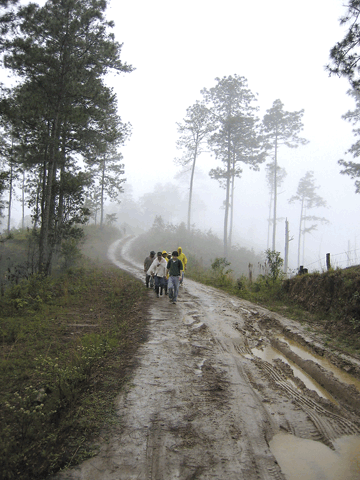
Every day, and often with little thought, Americans turn on their faucets, their washing machines, and their lawn sprinklers. In the summer, children in poorer neighborhoods wrench open fire hydrants and splash in the flooded streets. However, in the village of Terreritos, Honduras, water is a premium commodity. About one-quarter of its families have plumbing, and those who do receive only a pittance of water for daily use.
Enter Penn’s chapter of Engineers Without Borders (EWB). Fourteen members of the group traveled to Terreritos this past spring to address the village’s water shortage, and, in the process, quench their own thirst for out-of the-classroom experience.
As one of the non-profit’s 148 U.S. chapters, PennEWB remains true to its mission of helping developing communities improve their residents’ quality of life. “We aim to enable individuals to directly help other people in extraordinary ways while applying what they’re learning or practicing in their everyday lives,” says Alex Mittal, a senior management & technology major who serves as PennEWB’s president. “That’s something that appeals to a wide spectrum of the Penn community, and we’re actively working on spreading our message so that even more people can get involved.”
Though an engineering background is required to join the group, participants study a variety of disciplines, including design, medicine, and the humanities. “That’s not surprising, considering the interdisciplinary Penn environment,” Mittal says. Many of the students are pursuing dual degrees, or have graduate-school aspirations in various fields.
However diverse their ambitions may be, all share a similar motivation, voiced by Kate McArdle, a senior in the School of Engineering and Applied Science: “In class … we learn so much theory, do a ton of calculations, and [perform experiments] that, while useful, are still very much in a lab setting. But being able to actually go somewhere and use what we learned to directly help people that we met and got to know—that was so rewarding.”
Senior Angelina Benson-Glanz has family with roots in Panama. “I felt that this would be a chance to give back to my fellow Latin Americans,” she says. “The trip was an opportunity for me to see what life was truly like for my father growing up in poverty.”
The Penn EWB program is divided into class work and fieldwork. Tony Sauder, a hydrogeologist from Pennoni Associates engineering firm, taught the class during the spring semester, and accompanied the students to Honduras. The curriculum focused on sustainable development, Honduran society and culture, and the logistics of the final project.
The water source for Terreritos is a mountain spring located a mile from the center of the village, which provides a trickle—2.5 gallons per minute, roughly the amount of one shower—for the entire village’s daily water supply. Stringent rationing has to be employed for such a paltry amount. Since population growth in the village will necessitate a greater supply of water, the current method would soon prove inadequate. The solution was to access a spring three miles away that would provide an additional eight gallons per minute. A new pipeline will bring water from this new source to meet the existing system in a 2,000-gallon distribution tank. In the fall, the team will return to install a 5,000-gallon tank, ensuring a healthy daily supply of water for the households.
After finals, the team embarked on a two-week implementation trip to construct two spring boxes (devices which makes use of a natural spring, while keeping the water free from contamination) and begin the installation of the pipeline through critical areas. PennEWB worked with FUCOHSO, a non-profit organization helping rural families in Honduras, which will oversee the community’s assembly of the remainder of the pipeline. “Tony [Sauder] really stressed the importance of the sustainability of any development projects so that repeated work doesn’t have to be done, and also the importance of the support and actual help provided by the community so that they feel like it’s their own project,” says McArdle.
The benefits of the trip were not restricted to field experience. Some team members were hosted by people in the community and formed memorable relationships during their brief visit. “I had the opportunity to chat with my host family every day,” recalls Nicolas Blanchet, a College and SEAS sophomore from Mexico City. “I even recorded some songs they sang for me in my cell phone and I filmed them playing the guitar. I tried to teach them some English, but it was hard because even our Spanish is different.”
Closer to home, another PennEWB outreach activity is an after-school program at Saul High School of Agricultural Sciences in Philadelphia. Starting this fall, the group will guide the high-school students in the construction of a fully functional methane biodigester to convert livestock manure into methane fuel for cooking and heating. Such a device may be used in a future EWB project.
PennEWB will return to Terreritos to install the new distribution tank, assess the development of the pipeline, and gauge the sanitation conditions, possibly installing pit-latrines for waste containment. The group also has a promising lead into another water project in Cameroon, and many members plan to stay active this school year.
Andrea Lo, a senior who will continue her involvement with PennEWB as the organization’s University liaison, says, “The program challenged me to venture outside my own world and explore ways of helping less fortunate people, like those in Terreritos. It challenged me to be dissatisfied with living in copious comfort while others around the world don’t even have access to their basic needs.”
—Carter Johns C’07




